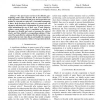Free Online Productivity Tools
i2Speak
i2Symbol
i2OCR
iTex2Img
iWeb2Print
iWeb2Shot
i2Type
iPdf2Split
iPdf2Merge
i2Bopomofo
i2Arabic
i2Style
i2Image
i2PDF
iLatex2Rtf
Sci2ools
108
click to vote
IPTPS
2005
Springer
2005
Springer
A Taxonomy of Rational Attacks
Abstract— For peer-to-peer services to be effective, participating nodes must cooperate, but in most scenarios a node represents a self-interested party and cooperation can neither be expected nor enforced. A reasonable assumption is that a large fraction of p2p nodes are rational and will attempt to maximize their consumption of system resources while minimizing the use of their own. If such behavior violates system policy then it constitutes an attack. In this paper we identify and create a taxonomy for rational attacks and then identify corresponding solutions if they exist. The most effective solutions directly incentivize cooperative behavior, but when this is not feasible the common alternative is to incentivize evidence of cooperation instead.
Related Content
| Added | 27 Jun 2010 |
| Updated | 27 Jun 2010 |
| Type | Conference |
| Year | 2005 |
| Where | IPTPS |
| Authors | Seth James Nielson, Scott A. Crosby, Dan S. Wallach |
Comments (0)

